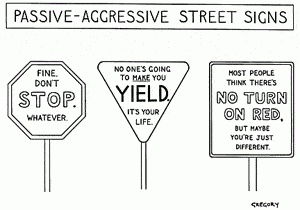
Passive aggressive behaviour is frequently misunderstood. What it is, is indirect anger. The person is unable to acknowledge to themselves that they are angry, so they push it away. However, when a strong sentiment like anger is ignored/denied it has a way of surfacing as another behaviour.
If anger is seen in your family of origin as a “bad” thing or if a parent/sibling expresses inappropriate rage, we might try to stifle our feelings of anger at any cost due to the messages that we have been given as children. The fear that if you express your valid feelings of anger that they will hurt someone else’s feelings or you will be punished for letting is show.
Passive aggression a covert way of “getting back at someone” without expressing or even in many cases recognising the anger they feel. It can be more damaging in relationships than genuine anger because it is always deniable and masked as something else which makes it very confusing and dysfunctional.
A narcissist could be “getting back at you” for something as mundane as asking for help to do some house work. They will keep putting it off and if you push the request harder they will deliberately do the job badly so that you don’t ask them to help again. Narcissists see people as objects to serve their needs, they don’t have to help or do mundane or unrewarded tasks.
Narcissists know that most people like to avoid confrontation, in fact they depend on it so they will go into a rage when asked to do something that they do not want to do. With a rational person you can calmly discuss their passive aggressive behaviour in a meaningful and constructive way. This is not the case with narcissists as they will see this approach as a criticism of them and will go into a rage to shut the conversation down and will then punish you at a later date for even suggesting that they might have “room for improvement”.
The best way to manage passive aggressive behaviour is to see it for what it is:
- State in a neutral manner that you thought that that person might have done a job badly deliberately so that you don’t ask them to do it (or any other thing that they don’t like) again
- Don’t get involved in an argument, it will be met with total denial
- Don’t question their denial as they will only stick to their story with more determination
- Repeat in a neutral manner what you think, if the same passive aggressive behaviour surfaces again
The narcissist may or may not change their behaviour, one thing that narcissists enjoy is the feeling that they are fooling someone, so they will not get such a “thrill” out of their passive aggressive behaviour if you can let them know that you can see it for exactly what it is, so they will not have “won” that point.
It is worth noting that if a narcissist cannot be passively aggressive with someone such as a boss or a figure of authority they will redirect that anger at someone else.
One other thing that will cause passive aggressive behaviour is to assume that a narcissist will pull their weight and behave like a team player. They will see that as you trying to take them for granted and will be offended that you did not recognise their “superior status” and will want to punish you for that in some way.





